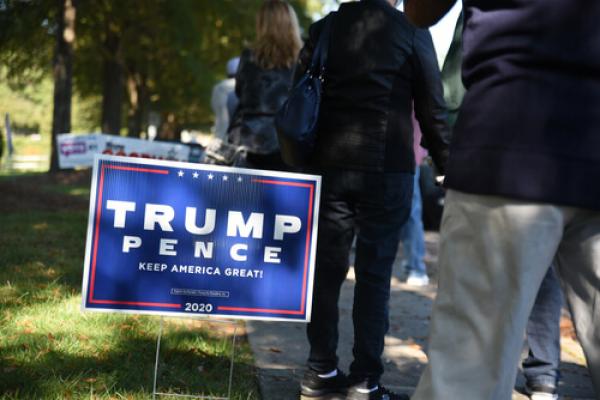It was a bright and sunny early fall day in the Atlanta suburbs as J. Nicole Morgan lined up to cast an early vote in the 2020 general election. The line outside her polling place, a local library, had a few dozen people in it. Most stood quietly, with masks on to prevent the possible spread of the coronavirus. One man near the front of the line wore a red “Make America Great Again” hat, the kind sold by President Donald Trump’s campaign.
Georgia law prohibits people from soliciting votes or displaying any campaign material within 150 feet of a polling place. Morgan didn’t know if the voter was breaking that rule, and she also didn’t know what she should do if he was.
“You don’t want the election line to get heated, but you also want to not have to see political paraphernalia while you’re voting,” said Morgan, author of Fat and Faithful and host of a podcast with the same name. She furiously Googled, but couldn’t find a clear answer.
Unfortunately, that’s because there isn’t one. There are many gray areas when it comes to what’s allowed at the polls, according to Anne Houghtaling, who currently serves as deputy director of the Thurgood Marshall Institute, the research arm of the NAACP Legal Defense Fund. Houghtaling helps lead the LDF’s Prepared to Vote and Voting Rights Defender initiatives.
What is voter intimidation?
Voter intimidation — harassing voters, spreading misinformation, or asking them about their citizenship — is never allowed under federal law. And many states prohibit explicit electioneering, such as handing out pamphlets endorsing a specific candidate. But when it comes to apparel, state laws and enforcement vary.
“Generally speaking, if you wear a candidate’s t-shirt, or an ‘I’m voting for Ruth’ t-shirt, if you’re just in-and-out voting, most places would seem to allow it,” Houghtaling said. “But because states vary broadly, it’s recommended not to do that.” Twenty states have laws restricting what voters can wear to the polls, many of them banning clothing and accessories that display a particular candidate’s name.
Morgan said a poll worker asked the man in the MAGA hat to remove it when he got to the front of the line, and he complied. But she wonders what she could have done had the issue been more serious.
“The place that we most commonly ask people to go to is 1-866-OUR-VOTE,” said Houghtaling. “That’s the election protection hotline.” The hotline is staffed by a group of nonprofit organizations and managed by the Lawyers’ Committee for Civil Rights, providing guidance, information, and help to any American regardless of how they’re voting.
As millions of voters head to the polls this election, organizations across the political spectrum, including many faith groups, are deploying resources to protect voting rights. For example, The Poor People’s Campaign is leading an effort to send nonpartisan poll monitors to sites in 10 key states. Many of these election protection efforts are taking place alongside a rise in voter intimidation. Experts fear that President Donald Trump’s recent call for supporters to “go into polls and watch very carefully” might lead to an uptick in polling place confrontations and violations that are more serious than candidate-specific apparel.
Federal law prohibits intimidating, threatening, and coercing voters at the polls. This includes aggressively questioning voters about their citizenship or criminal record, posing as an election official, and spreading false information about voter requirements, according to the ACLU.
Physically blocking access to the polls is also considered intimidation and shouting while not wearing a mask might also be considered a violation because of the ongoing pandemic, according to Houghtaling. She also said certain items of clothing, like apparel with Confederate flags and Proud Boys t-shirts, could be considered intimidating to some voters.
If you see something...
Voters and poll observers have several options when it comes to reporting violations:
- Check in with on-site nonpartisan poll monitors, including those from LDF, Poor People’s Campaign, or other faith-based groups
- Call the Election Protection Hotline (1-866-OUR-VOTE or 1-888-VE-Y-VOTA en Español)
- Call the U.S. Department of Justice Voting Rights Hotline (800-253-3931; TTY line 877-267-8971)
- Reach out to local and state officials, including official poll workers, county clerks, elections commissioners, and state boards of elections
Volunteers should listen to instructions from election officials when they’re at a polling place, according to Houghtaling. “If it is somebody official, like an election judge or poll worker, and they’re asking you to be farther away and telling you what you’re doing is not right, then I would definitely listen to that official person,” said Houghtaling. If it’s an individual who just doesn’t like what you’re doing, the best answer might just be to walk away, she said.
And what about handing out food and water, as many faith-based organizations are doing? That can also get complicated. Jason Bailey, a staff attorney at LDF, said federal law prohibits giving out “anything of monetary value” to voters when there’s a federal candidate on the ballot. “But we think there’s a gray area there,” he added.
Rev. Joshua Nelson, Pastor at Emanuel Seventh-day Adventist Church in Albany, Georgia, has been out at the polls offering water, snacks, and other support to voters nearly every day since the state’s early voting began October 12. “People were standing in line for five to six hours with no water, no food, no shade, nothing to sit on, and so we filled the gap,” said Nelson, who is volunteering his time in coordination with Black Voters Matter.
Nelson said his group checked in with lawyers and their county administrator to make sure they weren’t breaking any rules. But on their first day out, a white woman confronted them, using racist language and displaying a weapon. The woman later posted about it on Facebook, urging others to “defend the vote,” and the Black Voters Matter volunteers were told by county officials to stay 150 feet away from the polling site, according to Nelson.
Nelson doesn’t believe the volunteers broke any rules, but they’re complying with the 150-foot request so that they continue to provide assistance to voters. “We are definitely there with eyes open,” he said.
“It’s really important that when people are providing water or snacks to people in line, it’s not done on a partisan basis,” Houghtaling stressed. “It is, you are in line exercising your fundamental American right to your vote, and someone is providing you with sustenance to be able to do that.”
Got something to say about what you're reading? We value your feedback!






